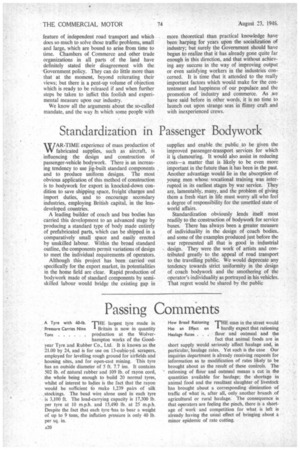Humpty Dumpty 4 exceptionally heavily laden bus with most ineffective
Page 21

Page 22

If you've noticed an error in this article please click here to report it so we can fix it.
braking equipment. descending a steep hill with which the driver is unacquainted. The vehicle is even being pushed from the back. There may be some curves on the way and, possibly a sharp bend at the bottom, which might Overturn the whole outfit and throw out many of the passengers.
Government speakers throughout the country have boasted of the number of Bills which have been furiously ,driven through the Commons and Lords; some have been of little consequence, others of a drastic nature, whilst a few have been short experimental runs into the mainly unexplored and difficult terrain of nationalization.
What benefits have been attained so far? Sops of a few shillings here and there, in the way of family allowances and a small reduction in taxation, which do little to balance rising prices in many directions and a currency value which is in a shaky condition, particularly abroad.
The only reasonably bright factor is our export trade, but that has been inflated only by penalizing the home market and may be curtailed unless something be done to invigorate our. people and inspire them with confidence and hope for the future.
Dissatisfaction is Spreading Rapidly One might have thought that those who put the Socialist Government into power would have put their backs into their work and done their best to show this Nation and others that they had confidence in their choice. Instead, there are growing dissatisfaction and less production per capita amongst all classes. Against the advice and, indeed, pleas of their own representatives in Parliament, some sections of the workers are spoiling their own cases for fair treatment by ignoring the advice of their union leaders and adding to the existing discomforts of large numbers of the public, thereby discrediting those who have been appointed to carry out legitimate negotiations.
Meanwhile, abroad we are sacrificing many of our interests and opening the way for the entry of rivals into markets and potential markets. We are casting away advantages and opportunities which are the fruits of many years of toil and sweat by those who, often at great sacrifice, built up our Empire. The expressions of selfsatisfaction on the part of certain members of the Cabinet and some of their followers do not appear to be justified by the results achieved, and there must be many, even in the Socialist Party, who have grave doubts as to the advisability of at least part df the programme which the Government is straining to carry out. Ill Opposition to Nationalization is Growing With regard to the threat of transport nationalization, officials of the Transport and General Workers' Union have stated recently that the opposition against this seems to be dying out, and that the majority of its members is in favour of State ownership. This is certainly not our view, nor that of any operators who know the feelings of their employees and of their customers.
So far, much of the fight against the nationalization of road transport, with which is inevitably bound that of the railways, has been what we may term shadow boxing. Our champions have been in the ring, but the claimants to the titles have not appeared. This may seem to the Government to be a clever move, permitting the representatives of our industry to beat the air until they are exhausted, and then to oppose them with antagonists fresh to the fray.
We do not, however, believe that such tactics will succeed in weakening the opposition. This, despite what may be said to the contrary, is steadily growing throughout the country. There are many workers in road and rail transport who do not look forward with any pleasure or joyful anticipation to becoming slaves of the State, bound to a rigid code and unable to change their employers when they may wish to do so. Trade and industry are unanimous in condemning the formation of an inflexible transport system which, by its very size and control, could pay little or no attention to individual requirements. It would be inherently unsuited to give that personal service which is such an essential and appreciated feature of independent road transport and which does so much to solve those traffic problems, small and large, which are bound to arise from time to time. Chambers of Commerce and other trade organizations in all parts of the land have definitely stated their disagreement with the Government policy. They can do little more than that at the moment, beyond reiterating their views; but there is a pent-up volume of objection which is ready to be released if and when further steps be taken to inflict this foolish and experimental measure upon our industry.
We know all the arguments about the so-called mandate, and the way It which some people with more theoretical than practical knowledge have been harping for years upon the socialization of industry; but surely the Government should have begun to realize that it has already gone quite far enough in this direction, and that without achieving any success in the way of improving output or even satisfying workers in the industries concerned. It is time that it attended to the really important factors which would make for the contentment and happiness of our populace and the promotion of industry and commerce. As we have said before in other words, it is no time to launch out upon strange seas in flimsy craft and with inexperienced crews.




































































